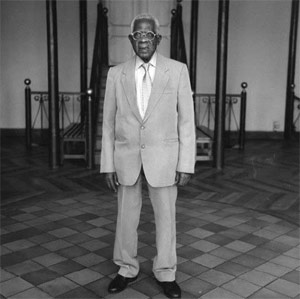|
May - June 2008

Issue Home >>
|
 Remembering
Césaire Remembering
Césaire
There is much to be said about this writer who has been lauded for
his writings and who has received numerous awards for his works
by Elizabeth Hackshaw
On April 17th 2008, the Caribbean lost one of its greatest poets. Born
in the town of Basse-Pointe in 1913, Aimé Césaire, Martinican poet,
playwright, essayist and politician passed away at the age of 94 on the
French Caribbean island of Martinique. Césaire’s voice shaped the
politics and poetics of the Francophone region. Elected mayor of Fort-de
France in 1945 Césaire did not retire from the political arena until
2001. During that period he helped draft the 1946 law making Martinique,
Guadeloupe and French Guiana French Departments. Although the law
afforded the former French colonies greater autonomy, the politicians
who favored Independent status for the islands criticized Césaire for
his role in Departmentalization. Césaire remained a vigorous critic of
colonialism. In his polemical essay Discours sur le colonialisme,
(Discourse on colonialism, 1950) he robustly attacked Europe and the
Western world for their role in the colonizing project and its
decivilizing effects on both colonizer and colonized.
In 1931 Césaire traveled to Paris on an educational scholarship. Paris
in the 1930s was home to many black American writers and musicians from
the Harlem Renaissance who had left a homeland plagued with racism and
segregation. It was during this period, while attending University that
Césaire met fellow French –speaking, black students Léon Damas from
French Guiana and Léopold Sédar Senghor, of Senegal. In 1934 the three
scholars started the literary review L’Étudiant Noir (The Black
Student). In the review they voiced many of the concerns that would
shape the Negritude movement. Their vision of Negritude focused on a
desire to redefine the black experience through a rejection of Western
ideology of black inferiority. Each of the founding members expressed
his Negritude as it related to his personal history, but the movement
would come to have a universal significance not only to those of African
origin but to all oppressed peoples.
Césaire’s Cahier d’un retour au pays natal (Notebook of a return to a
native land) written in 1939 articulated his Negritude; it is one of his
greatest literary legacies. In the Cahier Césaire explored the Antillean
condition in light of its colonial history. He exposed human and natural
landscapes infected with physical and psychological maladies, drawing
the Antilles in a manner that had not been done before. The Cahier was
also revolutionary in its form; influenced by the French surrealist
movement, Césaire employed poetic strategies that freed the poem from
traditional constraints, liberating both form and content. The poem ends
on a celebratory note emphasizing the notion of fraternity and the
benediction of creation.
There is much to be said about this writer who has been lauded for his
writings and who has received numerous awards for his works. St. Lucian
poet, Derek Walcott called Césaire one of the greatest poets of the
archipelago, French writer, André Breton considered the Cahier a
masterpiece. There is reason to celebrate and remember this writer, and
what gifts await those discovering Césaire for the first time.
On Thursday 8th May 2008, the French Section of UWI organized a seminar,
which was open to the public, to honour this great writer. The UWI Main
Library also held an exhibition from April 1st -May 2nd in memory of
this poet and anti-colonial activist.

|





